Sigourney Cantelo: ‘I had the perfect life but was really crumbling inside’
On the surface Sigourney Cantelo had the perfect life. But in reality she was broken. Now, the former Vogue beauty director is sharing her story and has launched a podcast to help others with health and healing.
Sydney Weekend
Don't miss out on the headlines from Sydney Weekend. Followed categories will be added to My News.
From the outside, Sigourney Cantelo had the perfect life.
The career, the family, the lifestyle. Happiness oozes from each social media post. Supportive husband, picture-perfect kids – one of each – with smiles on their faces and outfits as stylish as their fashionista mum. Great friends, many of them celebrities, and opportunities most only dream of.
Yes, she had it all — until a dark cloud that had pursued Cantelo finally caught up with her, resulting in a three-week stay in a mental health facility for the debilitating anxiety, depression and undiagnosed ADHD that had, under the weight of expectation, taken over.
Because at the end of last year, on the inside she was broken.
Despite keeping up appearances, she was shattered. Exhausted. Desperately down on herself for trying so hard to, in fact, have it all – when all she saw in the mirror was a failure.
Even though the world saw the opposite, she saw a woman who wasn’t doing enough. A mother who wasn’t doing enough. A wife who wasn’t doing enough – but in her reflection was a woman who simply couldn’t do any more.
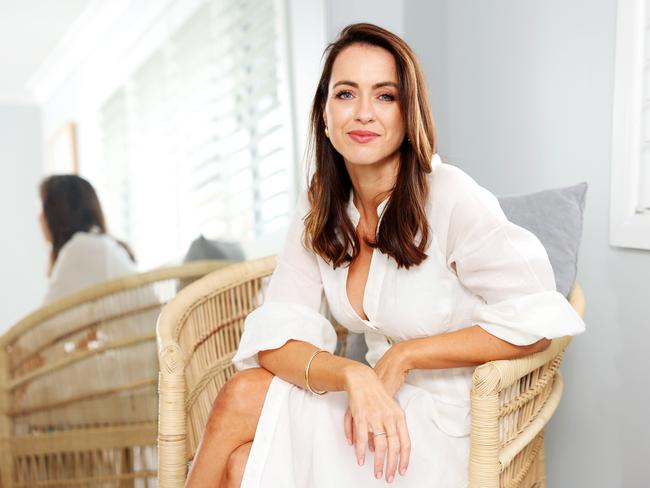
She was shouting at the kids. Crying for days. Shying away from social events she once thrived on, engagements she’d built a thriving business on.
She broke.
But today she stands, proudly refashioned. Re-built. A work in progress, sure. But she’s here. And she’s smiling.
“I was crying a lot,” an emotional Cantelo says of her darkest times. “I was always feeling like I was on the edge of tears – I was feeling pretty hopeless.
“I noticed I was just withdrawing from social events – I get invited to a lot of events and I was finding it really hard to go and put on a happy face to talk about stuff. Luckily, I’ve got really beautiful friends, but even then, if someone just asked me how I was, I would start to cry.
“I’ve always been a crier so it wasn’t completely out of character, but it had gotten to a point where I wasn’t functioning properly.
“I mean, I wasn’t in bed all the time and not able to work – I always had to show up, and show up on socials on the days that I could and put a smile on my face.
“But I felt like I was crumbling inside. I just felt like I was failing. And the thing about it was that I couldn’t work out why.
“I knew yes, the kids were challenging me and yes, their emotions were big – but why couldn’t I deal with that? What was happening inside of me?”
Cantelo lives on Sydney’s northern beaches with husband Damien and children Max, 12, and Louella, 8 – better known as Lulu.
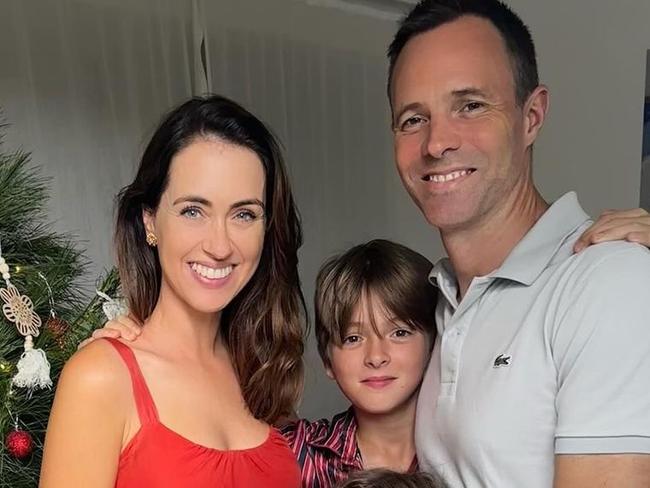
The one time fashion and health director of Vogue Australia was in the media and fashion industries for years before she left to start her own website, Beauticate, which turns 10 this year. She’s been in the spotlight ever since, interviewing the likes of Elle Macpherson, Elsa Pataky, Delta Goodrem and Guy Sebastian for her site which lovingly combines “beauty” and “educate”, sharing tips on looking beautiful to more than 1.3 million people every month.
Now the 42 year old wants to help them feel beautiful on the inside too. She’s just launched new podcast, Beautiful Inside by Beauticate – the culmination of her goal to redefine the conversation around beauty and wellness, destigmatising mental health and encouraging healthy, open discussion – like this one.
“It’s such an epidemic – women are just so perennially exhausted – there’s just so much pressure to be … better,” Cantelo says.
“Even with parenting anxiety – we all want to be the best, and there’s so much information now about how to be better and there’s been so much different, conflicting advice over the years. I remember when I had Max, it was all about (‘baby whisperer’) Tizzie Hall and strict timelines and routines – and now it’s all about attachment and co-sleeping. And I’d be listening to these different experts and I’d be like, ‘I’ve done it all wrong, I’ve messed my child up, he’s going to be in a therapist’s office one day because I didn’t give him enough attachment.’ We just put so much pressure on ourselves.
“There’s so much pressure and we have to be on all the time – and social media and work … I think it’s just that hyper vigilance we’ve got because of work and also the awareness that we are bombarded with so many depictions of perfect parenting, so we’re so much more aware than we ever were of how one could parent if one was perfect.”
Are you nodding?
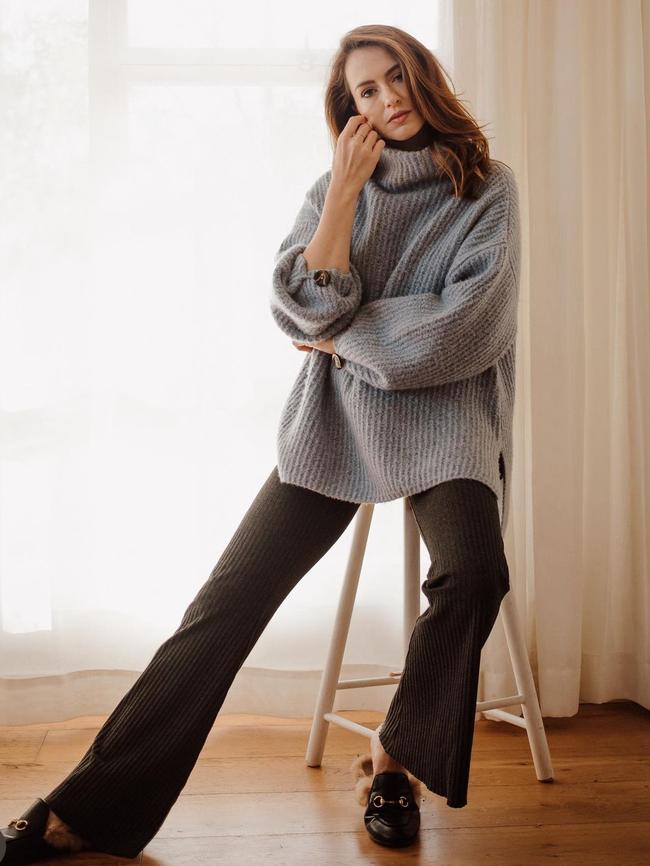
It’s no surprise that Cantelo isn’t alone. She is among some 2.1 million Australians suffering some form of depression. That’s one in five women and one in eight men. According to the Australian Institute of Health and Welfare, 21 per cent of Australian women have anxiety disorder and almost half – 45 per cent – have experienced a mental health problem at some point in their lifetime.
A recent study showed an alarming 61 per cent of Australian workers had reported burnout – significantly above the still-shocking 48 per cent global average. “Workaholism”, fuelled by social media and the 24/7 aspect of busy – and expensive – modern day life, is rife.
Sharing her deeply private struggles was a hard decision, but ultimately one that has made her stronger, too. A decision made because she was strong enough to make it. Finally. And only because she knew she needed help, which came in the form of a three-week stay at rehab and recover institution, South Pacific Private, after which she was also diagnosed with ADHD.
“I was like, ‘Do I share this stuff?’ – it was seven months ago that I went in South Pacific Private, and there is stigma to go into a treatment centre,” Cantelo explains.
“I couldn’t share it at that time, obviously – I needed to process it myself. But after I came out, I felt so much better. And the experience that I had was so life changing.
“I told a few friends about it, and I just thought if only they could teach this stuff in schools. If only there were more places like this, where people could go.
“In my head, I was calling it a mental health retreat, because I was going to do some work on myself – I felt like I’d been given such a beautiful opportunity. Like I had a golden ticket – I was going to go in, and I could focus on my healing for three weeks under the care of a team of professionals – how lucky am I?
“I wish that more people had the opportunity to do something like this. It shouldn’t be stigmatised, or be a shameful thing.”
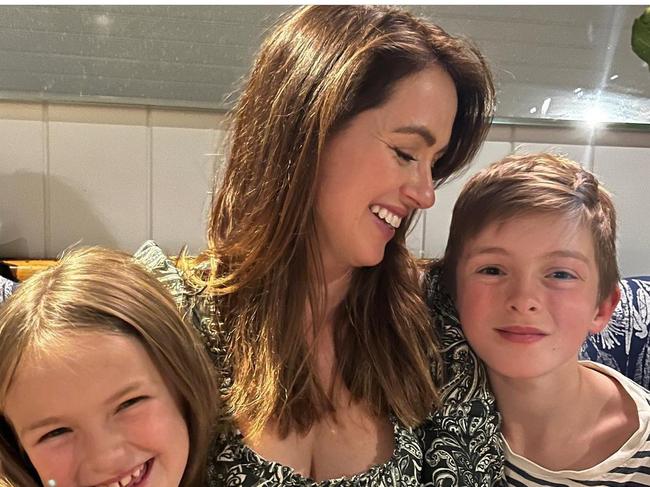
When she says golden ticket, she means it. The full cost of her treatment – some $17,000 – was covered by her health fund. And if you’ve just switched health funds and are within the waiting period, a mental health waiver means urgent cases can be fast-tracked.
“I grappled with the decision for weeks – I asked every psychologist and counsellor I knew,” Cantelo says.
“Funnily enough, one person said, ‘I don’t think you should leave Max’ – and that just plagued me because I was like, ‘Oh, am I abandoning him?’ But Max’s counsellor said to me, ‘You have to fit your own oxygen mask.’”
That struck a chord with Cantelo because abandonment was at the heart of issues she didn’t realise were affecting her now, decades later in adulthood.
Her childhood – as a single child – was a happy one, until her parents got divorced and her father, Bill, was awarded custody because her mother, Maxine Gray, a reporter for ABC series Beyond 2000 – was often travelling for work for large chunks at a time. She was sent to stay with her nanna on the family farm in Wyalkatchem in WA’s central wheatbelt, which has a population of less than 400. And there she was loved – enveloped by remnants of a family she felt she’d lost and herds of cousins. But despite it all, it was her parents she wanted.
Cantelo remembers crying into a jar, so her mum could see the tears she shed in her absence. Tears that evaporated.
“I didn’t want to put my parents in it … I know breakups are traumatic for everybody, and I said to the therapist, ‘I don’t want to make it sound like my parents have done this to me, and I don’t want to make people who are going through separations and divorces think that they’re damaging their kids,’” she says.
“And she said, ‘Well, it’s that they weren’t able to meet your emotional needs, and because you were undiagnosed ADHD, you had very high rejection sensitivity, so your mum travelling, and your parents splitting up and sending you to the farm, you took all those things as signs that you weren’t loveable, and you weren’t enough.’
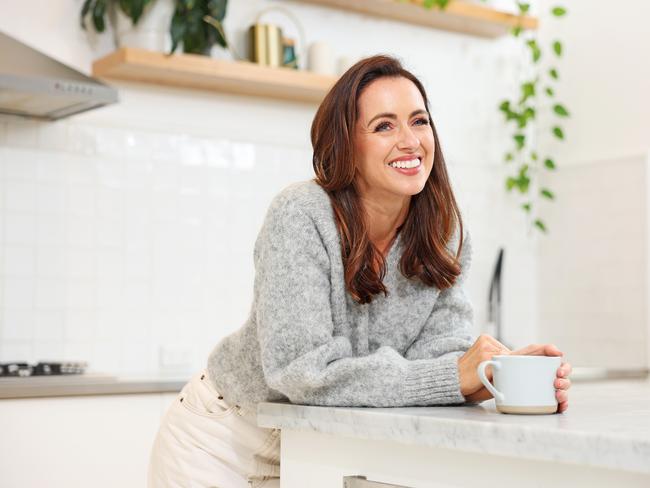
“The fact that we moved so much … I didn’t feel like I ever belonged. I was coping, I was getting through the day, but I just knew there had to be some kind of circuit breaker.
“My kids and I would get into these cycles, we would get locked into these battles, I guess, and I knew that it was something to do with the way I was programmed, from my childhood.
“The way I was responding – I just couldn’t unpick it, and I didn’t understand why – and also why I responded so drastically. I would maybe keep it together while we were having our battles, but afterwards, I would cry and cry, and I was like, why is this hurting me so deeply?
“Why am I so stressed about this?
“And that was when, you know, that was when I took myself off to the psychologist and he said, ‘This has all got to do with your childhood trauma.’”
Cantelo was stunned by the word trauma. To her, and so many, that meant sexual abuse, physical abuse, domestic violence.
“And he said, ‘No, it’s your parents’ separation.’
“It was a pretty messy separation and he said that was affecting everything. I guess I just felt like there was a block and I had to deal with it.
“I was trying to be better, I was trying so hard to be the parent that I wanted to be, and I just felt like I was struggling, like I was exploding and my emotions are all over the place.
“There’s something wrong here and I needed to fix it. And it was scary, for sure – it’s like Pandora’s box – but to me, it seemed like an amazing opportunity and I was so lucky because Damien and my mum really stepped up and said, ‘You need to go and take the time.’
“Going in” meant being cut off from the world for three weeks. Twenty one days. Five hundred and four hours. That’s a lot of bedtimes, school runs, sports training and work meetings to miss. But a whole lot of time to focus inward, and heal – so you can keep going. Oxygen mask on.
“That’s no phones, no laptops, smart watches – not even a novel, because they don’t want you to have anything that’s going to allow you to escape from your feelings,” Cantelo says. “So nothing that you could do to numb yourself.
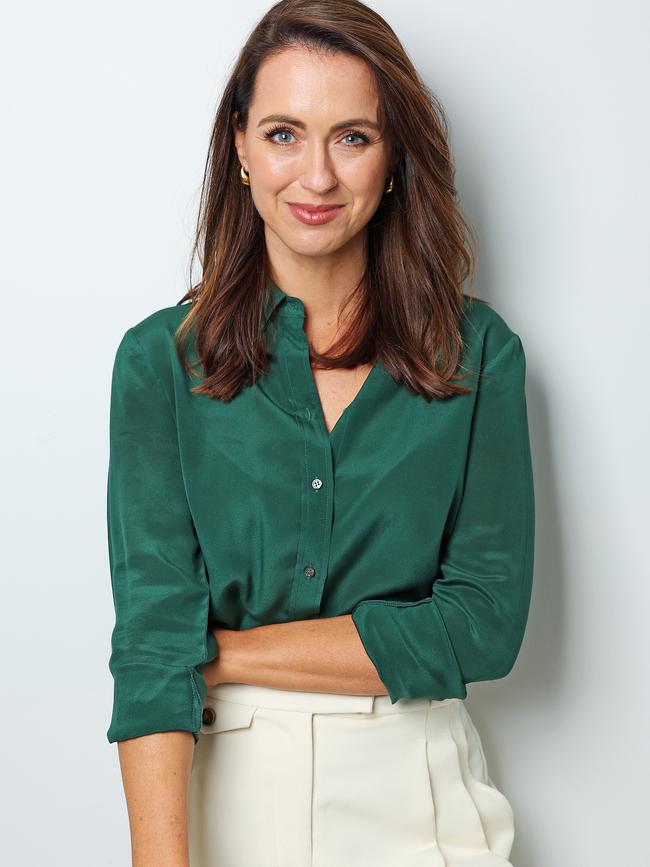
“Obviously there’s no alcohol and they check your bags for everything, so they’re looking for drugs, alcohol, vapes, electronics. Even the packing list is very specific. You can’t bring in anything with cords because of people with self harm tendencies.
“You can’t take glass bottles, no nail files, scissors, all that kind of stuff – but you’re allowed to bring self help books.
“All of that was actually a blessing because I was able to switch off for three weeks which, for me, is something we just don’t do.
“I mean, for the first few days, I felt like I was missing a limb without my phone, and that probably lasted about a week – but after that, I felt so free.
“And the experiences in there – just the humanity of it – the connection, the support – you wouldn’t expect that. I was so apprehensive and so scared. I cried and cried for the first few days. I was terrified.
“As I was walking in I was thinking … am I being dramatic? Is this over the top?
“I was in there with all sorts, all walks of life, people with major drug and alcohol dependency issues, people with serious mood disorders.
“It’s intimidating, because they don’t separate you based on what your problem is, so you’re all in these groups together and I was worried that I’d be laughed out of there, because I am very fortunate. I was worried my problems weren’t big enough.”
Cantelo needn’t have worried. The support and community she found within the hospital’s walls made the hardest time of her life also one of the most poignant. “I walked in, and you walk past the nurse’s station, and that’s where everyone gets their meds handed out twice a day – it’s like One Flew Over the Cuckoo’s Nest,” she says.
“In the line, everyone’s really kooky – it’s kind of like a school camp or boarding school or something – there’s a lot of in-jokes and camaraderie, and you’re new and you feel like … ‘Oh my gosh, where am I? What am I doing?’
“And this lady came up to me – because I was still crying – and she said, ‘Are you new? Don’t you worry, you are going to be wrapped up in the biggest bubble of love, you will be fine.’
“I found out later that she’s a lawyer, and was there for alcohol (abuse). You get all different types of people, and you’re all together. And it’s so beautiful, because you just have these moments of connection.
“You do these morning community meetings with like 55 people, and it’s like a zoo, it’s just raucous – and there were some big personalities there. You have to go around and do your names, claims and feelings, which is very much a bit like the 12 steps, so they basically treat anxiety and you learn to treat that, like an addiction – so you’re in recovery for … anxiety, or alcoholism, or whatever your issue is.”
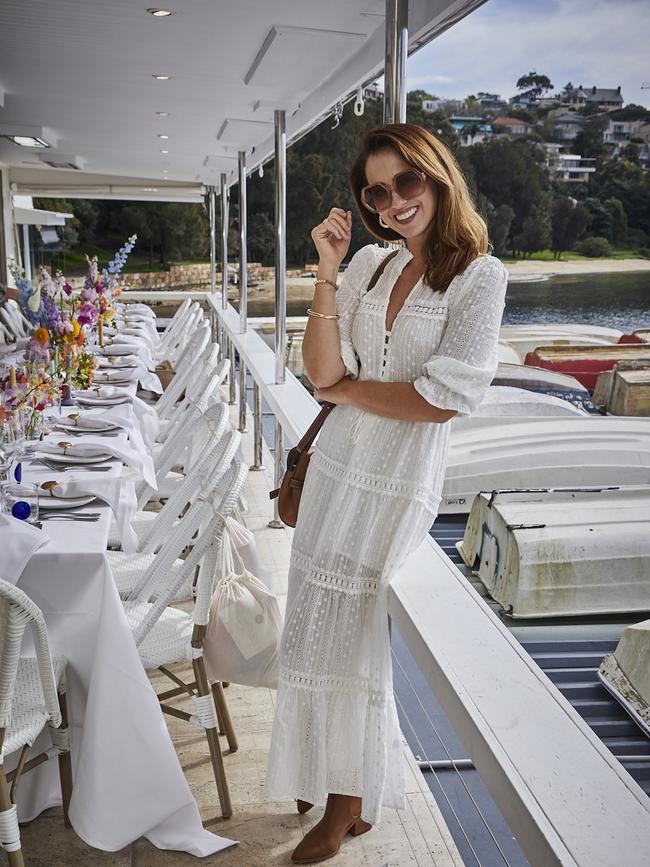
Cantelo attended daily lectures, went to AA meetings, NA meetings, just to learn, absorb, grow. Her biggest lessons were around co-dependency, which is the concept that anyone with some adverse childhood experiences or childhood trauma is often co-dependent.
“You think of co-dependency as just depending on other people, but it’s actually if you can’t really put a finger on how you’re feeling or you don’t know how to name your emotions, you are people-pleasing, you get really affected by other people’s moods,” she explains.
“There’s also ACA meetings, which are for adult children of alcoholics and dysfunctional families. And you basically do the 12 steps – but you do it for having had a dysfunctional childhood or you do it for being co-dependent.
“You can have a sponsor, you learn about how your upbringing has affected you as an adult, you learn to re-parent yourself. It’s such deep, amazing work. It’s extraordinary.”
Since her experience, she has been diagnosed with ADHD. She has started medication – which made her nervous at first – but ADHD medication, together with antidepressants, are helping.
“I suspected I was, after seeing a list of symptoms and two of my close friends were diagnosed recently and I’m just so forgetful,” Cantelo says.
“I’ve always got a million tabs open – I’d start all these different work things and I could just never get them finished. I always felt like I had a vice of anxiety around my chest.
“I would get through the end of the day and I’d be like, ‘I feel like I haven’t done enough’ and there was this constant low level anxiety. I just could never relax.
“And since I’ve been on (the medication) I’ve just felt that vice loosen. I’ve just felt that constriction in my chest loosen. I feel like I can breathe again.”
Over the years, her anxiety, depression and undiagnosed ADHD would land her in hospital every so often, manifesting in physical ways and leaving her with another load on her shoulders – trying to find the root of her chronic pain.
“I’d end up in hospital with viral meningitis, or break my nose with the kids playing soccer – I burnt my face with hot oil – I’d have all these accidents and I was like, what is that about? Is that your body going, I’ve had enough, I’m checking out, let’s go to hospital again and you can have a little bit of a rest,” she laughs.
“I remember going to hospital with the meningitis – I was just so happy – I was in a hospital room, I couldn’t work …
“The whole way through I was like – no, it’s not enough,” she says of the career she’s built. “It was never enough. And I think it’s based on your childhood beliefs.
“What I learned is I have these beliefs – that I have to do more, or I’m not loveable … and that’s all based on messages that I got as a kid. I just needed extra nurturing.
“Maybe more resilient kids or non neurodivergent kids would take all that in their stride, but it’s just having an awareness for how your brain works, and how that affects your emotions and your emotional needs.
“And that takes us right back to the beginning – how much pressure we put on us, and how much we put on ourselves as parents, to meet those emotional needs.”
Today, Cantelo is different. And she’s stronger for it. “This has changed my life,” she says. “I’ve had so much healing and things I needed to talk to my dad about, it has opened up discussions within the family about things.
“I’ve since had the most amazing lunch with my dad and we talked about things that we would never ever have had the courage to talk about. He says things now and I don’t get triggered like I used to.
“I’ve met my inner child – I know it sounds crazy, but I did the trauma workshop, which is called Changes and you do this incredible work where you basically meet your inner child and you nurture your inner child, and then you go and confront the people who hurt you growing up.
“Now I wake up feeling a real sense of purpose and meaning and I’m just so excited by it. And I feel so lucky that I get this opportunity and that I can talk about it and hopefully help people. For me, that’s all I want.
“I finally feel like I’ve found the thing that is gonna help. If I could save one person, if I can help one person, then that’s everything.” ■
Beautiful Inside will feature candid conversations with guests including UK entrepreneur and media personality Trinny Woodall and PE Nation’s Pip Edwards who share their own journeys and insights into maintaining inner and outer beauty. Cantelo also shares her remarkable path to healing. Find it where you get your podcasts now.



